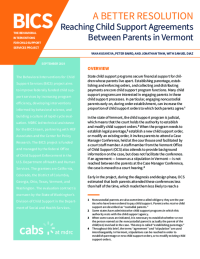A Better Resolution: Reaching Child Support Agreements Between Parents in Vermont
The Behavioral Interventions for Child Support Services (BICS) Project

In the state of Vermont, the child support program is judicial, which means that the court holds the authority to establish and modify child support orders. When the program needs to establish legal parentage, establish a new child support order, or modify an existing order, it invites parents to attend a Case Manager Conference, held at the courthouse and facilitated by a court staff member. A staff member from the Vermont Office of Child Support (OCS) also attends to provide background information on the case, but does not facilitate the conference. If an agreement — known as a stipulation in Vermont — is not reached between the parents at the Case Manager Conference, the case is moved to a court hearing.
Early in the project, OCS estimated that both parents attended these conferences less than half of the time, which made them less likely to reach a stipulation outside of a court hearing. Furthermore, even with both parents present, many of those meetings did not result in stipulations. OCS leaders believed that child support outcomes could be improved if more parents attended the meetings and reached stipulations. Since stipulations typically happen earlier in the process than judicial hearings, increasing stipulations can reduce the time and hassle involved in establishing orders for both parents and OCS, which could mean child support payments are made sooner.
The BICS team worked with OCS to design an intervention that would achieve two goals: (1) to increase parent participation in the establishment process (for both parentage and new orders) and the order modification process, and (2) to increase the number of cases where the parents reach agreement on at least one important issue outside of court.
The intervention had two main components: (1) a change to letters and outreach to increase participation in meetings, and (2) structural changes to the meetings themselves to increase the number of them that resulted in agreements between the parents. The central innovation was an OCS-led “Resolution Meeting,” created for the study as an alternative to the court-based Case Manager Conference. Both parents were invited to attend the Resolution Meeting using letters and forms redesigned following principles of behavioral science. When parents arrived at their local child support offices for Resolution Meetings, OCS staff members asked them to complete a priming exercise designed to get them in a mindset focused on the needs of their children, with the idea that that mindset would make them more open to reaching agreement. Resolution Meetings were designed to be perceived by parents as respectful, neutral in tone, participatory, and helpful.
To test the effectiveness of the intervention, 947 cases were randomly assigned either to a group that received the intervention or to a control group whose cases were handled according to the business-as-usual practices. To measure parent engagement, OCS focused on attendance at the targeted meeting (that is, the Resolution Meeting for the intervention group and the Case Manager Conference for the control group).
The study found that parents in the intervention group were more likely to attend and had better meeting outcomes than parents in the control group. The intervention increased the rate at which both parents attended the targeted meeting by 8.4 percentage points, which is an overall increase of 31.9 percent. Additionally, the intervention increased the proportion of cases where stipulations were reached at the targeted meeting by 11.3 percentage points, which is an overall increase of 91.1 percent. Both of these effects are statistically significant.
In addition, the average length of time between the initiating action (a case opening or a modification request) and stipulation at the targeted meeting was 70 days shorter for parents who reached stipulation in the intervention group than for similar parents in the control group, which represents a 72.9 percent decrease. This finding is nonexperimental.
The outreach materials and the Resolution Meetings were well received by parents and OCS staff members. Parents said that the redesigned materials were helpful, and staff members found the BICS approach more respectful toward parents. All of these results suggest that child support programs can use these strategies to effectively engage parents in establishing and modifying orders.






